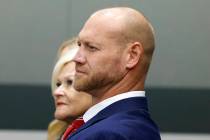Sands’ officials, Suen differ on Macau foothold bid
Las Vegas Sands Corp.’s first bid to gain a foothold in Macau fell apart for much different reasons than those given by onetime consultant Richard Suen, a former company attorney testified Monday.
When the consortium Asian American Entertainment Corp. Ltd. dropped Sands as a partner in January 2002 to team up with a rival, “it came as a complete surprise,” said George Kinmonth. “It was completely contrary to the understanding we had with Asian American.”
Kinmonth, a British native who has spent more than two decades as a Hong Kong attorney, was hired by Sands in October 2001 to help shepherd its bid through the competition set up by the Macau government for three new gaming licenses. When Asian American went in a different direction, Kinmonth helped Sands rapidly assemble its successful replacement bid as part of a group headed by Galaxy Casino Ltd.
During that crucial time, Kinmonth said, he had never heard of Suen, his company Round Square or any of his associates.
Suen, now in the third week of a jury trial to pursue his claim for a $328 million fee for his work in helping Sands gain its lucrative position in the former Portuguese colony, has brushed aside the suggestion that Asian American’s switch from Sands as a development and management partner to a British company, T.P. Aspinall & Sons Ltd., had any significance. Suen and Sands, particularly former President and Chief Operating Officer William Weidner, negotiated the terms of Suen’s employment for months but never reached a signed contract.
The critical factor, Suen has testified, was that Asian American had lined up the China Development and Industrial Bank for financing. Because of its ties to the ruling political party in Taiwan, the bank was considered a pariah by China’s central government in Beijing. Suen argued that Sands would torpedo its chances by linking up with the bank.
Kinmonth also testified that he considered Beijing’s influence as a nonfactor in selecting the new gaming concessions.
China’s Basic Law, he said, had created a shield of autonomy when it came to how the two special administrative regions, Hong Kong and Macau, governed themselves. Both had been long-standing colonies, and both had developed economies and legal systems far different from the Communist structure in China.
“If you go to Hong Kong now, you will still feel as if you are in the Hong Kong of old,” Kinmonth said.
Hong Kong returned to the Chinese fold in 1997, followed by Macau two years later. Both followed the same governing template that falls under the slogan of one country, two systems.
In the Macau casino derby, that meant forming an advisory commission in late 2001 to rank all 18 qualified bidders according to a numerical formula to filter outside influence. The Sands bid finished with one of the top three scores.
Suen, by contrast, pushed the strategy of courting top Beijing officials because they appoint and oversee Macau’s chief executive. Suen credits this approach, capped by a July 2001 meeting in Beijing with the vice premier whose responsibilities include Macau, as taking Sands 90 percent of the way to getting a license.
Kinmonth also worked with Sands when Singapore sought competitive bids for casinos in 2004. There, he said, Sands ranked first in a very similar process without the help of Suen.
Under cross-examination by Suen attorney John O’Malley, Kinmonth said his role was to organize the Macau bid and ensure all legal requirements were met, not vouch for the accuracy of documents like he would for a company selling securities.
In addition, he said he did not know about a meeting Sands’ top officials had with Macau chief executive Edmund Ho in early 2002, after the Asian American bid imploded.
At that session, Suen has said, Ho pushed for Sands to join forces with Galaxy to keep its bid viable.
Contact reporter Tim O’Reiley at toreiley@reviewjournal.com or 702-387-5290.






















